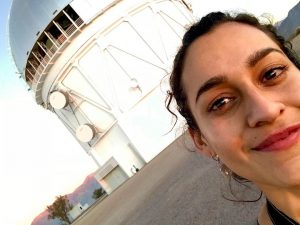
Alexandra Amon is a postdoc at the Kavli Institute of Particle Astrophysics and Cosmology at Stanford University and the SLAC National Laboratory. She’s interested in observational cosmology from weak lensing and large-scale galaxy clustering. “Basically, figuring out what our Universe is made of and how it has evolved through time using pictures of galaxies”. She currently co-leads both the shear-catalogue testing and deep-fields analysis groups. She’s excited about “doing science” with the vast amount of DES imaging data – pinning down constraints for the parameters that describe our Universe. “But that part is really just the tip of the iceberg above water. It takes a lot of work from a lot of people to get to catalogues documenting the shapes of and distances to 10s of millions of galaxies! I’m pretty lucky that I have a bit of a thing for systematics tests”.
We asked Alexandra a few more questions. Here’s what she had to say:
When did you know you wanted to be a scientist?
Unusually, this came late for me- I’m not sure I really knew what astrophysics was until I was about 16! I grew up on the tiny Caribbean island of Trinidad and astrophysics isn’t really a normal topic of conversation there….yet!
What motivates or inspires you?
It’s pretty explanatory that the idea of figuring out what the Universe is made of and how it works is motivating! When it feels difficult, beyond the thought-provoking nature of our field, I’d say other people in the field: in DES we’re lucky that we work in teams of interesting and driven people from different parts of the world- lots of them have inspiring stories!
Do you have any hobbies or take part in sports?
I’m happy doing just about any sport once it’s sunny and warm, particularly ones in the water- living in California is sweet! I try to surf (try being the operative word!) and sailing, yoga and scuba diving are old favourites!
If you weren’t a scientist, what would your dream job be?
Definitely something data- and science-related, geared towards environmental studies and fighting climate change!
Any advice for aspiring scientists?
An aspiring scientist is probably already curious and will likely be taught the coding and statistical skills they need along the way, so I’d say that there are harder, non-taught parts of becoming a scientist. Don’t try to “fit in”- you shouldn’t have to. It’s hard to remember when looking around a room of scientists usually, but science is for everyone and the environment *should* be one that makes that clear. Besides, the science itself will benefit from diversity! Happiness breeds productivity and that hinges on feeling part of the team and that you have a voice, so don’t only try to make that come true for yourself, but also for others in the team.